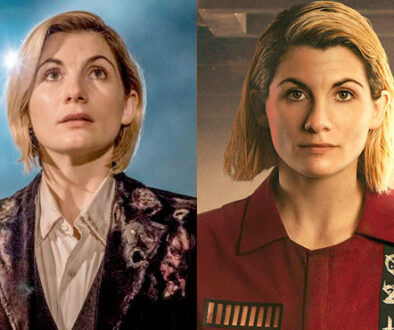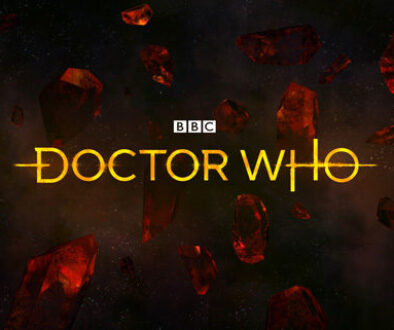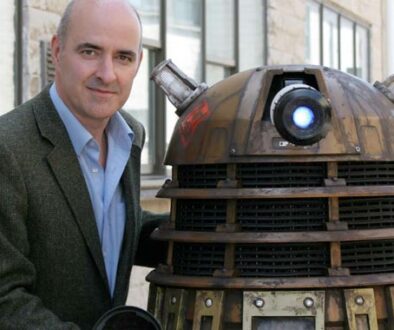“Can You Hear Me?” Review – Worth a Second Watch
Clint Hassell gives his SPOILER-filled commentary on the seventh episode of Series 12.

Note: this review contains full SPOILERS for episode 7 of Series 12.
The unique promise of science fiction is its ability to cage complex metaphors in fantastical wrappings, allowing the audience to engage with difficult subject matter in a non-threatening way. Effortlessly combining dream imagery and a non-linear storyline to create a disquieting atmosphere, “Can You Hear Me?” offers an insightful look at mental health that is sincere and frank, without being overly earnest. Further, the episode is veritable treasure trove of moments that provide much-needed development for two of the central characters.
Though it pulls plot points and thematic elements from “Amy’s Choice,” “Vincent and the Doctor,” and Class’ “Nightvisiting,” “Can You Hear Me?” most closely resembles an episode of The Sarah Jane Adventures. Unwilling to terrify its young audience by putting Luke, Clyde, and Rani in immediate mortal danger, a typical Sarah Jane adventure often included a vaguely defined villain that served as a metaphor for the more personal struggle of Sarah Jane’s young cast of characters. Rather than threatening to, say, atomize Luke Smith, an alien might threaten to extinguish the sun – – a move which was not only more budget-friendly, but actually increased the stakes from the personal to the global.
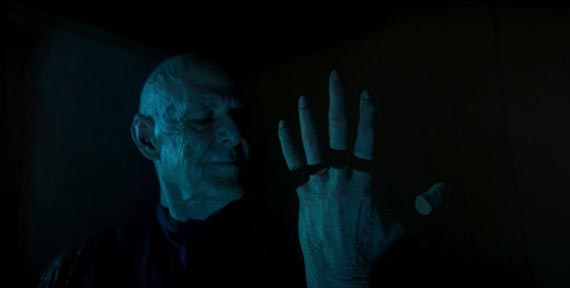
The villains of “Can You Hear Me?” are crafted from a similar child-like simplicity. Zellin feeds human nightmares to his immortal goddess of a partner. That sounds terrifying, but . . . how exactly does that cause one to suffer? It’s silly when you consider the details, yet it works perfectly within the episode, partly due to Ian Gelder’s performance, but mostly because Zellin and Rakaya are never written to be fully realized characters. Representing a powerful force that can never be totally overcome, only temporarily restrained, that feeds off of one’s doubt and guilt – – the two gods are clear metaphors for depression. “The cruelty of [mankind’s] own minds, directed towards themselves,” Zellin comments, “the endless voices telling themselves that they’re incapable and unworthy.” Zellin and Rakaya wield power not because they are unstoppable but because they prey on humanity at its weakest, at its most fearful. One of the episode’s finer points is its acknowledgment that confronting a fear allows one to control it, the implication being that confronting one’s depression enables one to overcome it as well.
However, not everyone is able to “live with their fear, doubts, [and] guilt,” or to “face them down every day,” and “Can You Hear Me?” is careful not only to examine how self-doubt affects mental health, but to provide several examples of characters reaching out to find that “help’s out there, as much or as little as you need.” While Tibo finds camaraderie and understanding in group therapy, a young Yaz is given advice, while sitting on the roadside. “Feeling things isn’t wrong,” Officer Patel says, “What if this moment, why you want to run away from everyone, including yourself, it just that – – a moment? . . . I’ve been where you are. Moments change.” By demonstrating that assistance can come in many forms, the plot raises the point that there is no one way to achieve mental health.
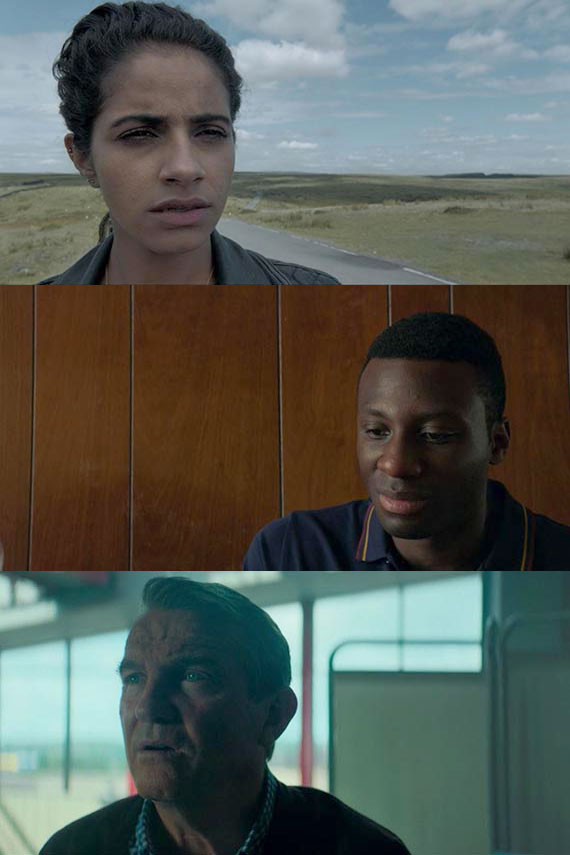
It should be noted that, while Tibo feels isolated from human interaction by technology such as voice mail and self-service checkouts, the episode’s animated sequence states that the development of technology was key to the inhabitants of the two colliding planets first realizing that internal strife was pointlessly damaging and then overcoming their interplanetary warfare. This directly echoes Nikola Tesla’s statement that, “With [advanced] levels of technology, [one] must understand there is no need for violence.”
Beyond its frank portrait of depression, “Can You Hear Me?” offers a plethora of moments that help define the Thirteenth Doctor, separating her from previous incarnations. Written by scriptwriters unaware that the Thirteenth Doctor would be female, most of the Series 11 adventures featured a Doctor that lacked distinction beyond Jodie Whittaker’s friendly warmth. In a pointed counter to the secretive Doctor featured in “Fugitive of the Judoon,” “Can You Here Me?” demonstrates how tied this Doctor is to her companions. Freed from Yaz, Ryan, and Graham until “tomorrow, lunchtime,” Thirteen finds that she has no idea what to do with herself. Arriving in Aleppo, she can’t help but narrate to her missing colleagues. The dialogue sounds in character, a fact made all the more poignant when she realizes she is alone. “Oh!” she cries, “Who am I supposed to share all of the interesting stuff with?”
Later, the Doctor is genuinely upset when the TARDIS, which includes a database that details everything that has existed and “will ever exist,” is unable to identify strands of Chagaska fur. This scene not only sets up a nice reference to the TARDIS’ telepathic circuits, but also allows Whittaker to display a greater range of emotion.
Moreover, the Doctor gets to express genuine awe. Beyond marveling at the ingenuity of Tesla or Ada Lovelace, or the bravery of Noor Inayat Khan – – human traits that are admirable, but firmly within the Doctor’s wheelhouse – – Thirteen is impressed with the technology that imprisons Rakaya and recognizes Zellin as “a mythical name, way beyond this universe.” Modern Who has positioned the Time Lords as the pinnacle of achievement, and the Doctor the best among her race. It’s rare that the series presents a threat that eclipses the Doctor’s ability, and it’s notable here that, not only is the Doctor not capable of destroying the immortals, she can merely repurpose the gods’ original prison in order to trap them again.
Most importantly, “Can You Hear Me?” dares to show its central character as fallible. Without questioning why Rakaya was trapped within her celestial prison, the Doctor rushes in to free her. Actions like this happen frequently in Doctor Who and, usually, the Doctor is in the right. Here, the Doctor’s impulsiveness is her undoing. While Zellin claims, “I used your instincts against you,” the Doctor was already working to release Rakaya before he leads her to believe that he was feeding nightmares to the trapped goddess.
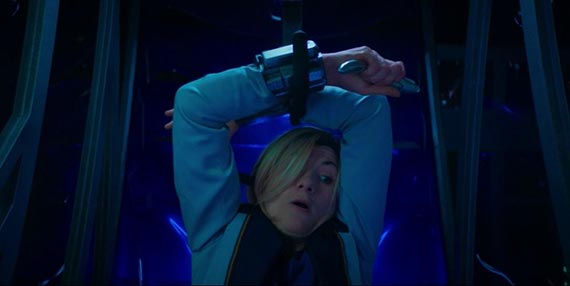
Looking beyond the Doctor, “Can You Hear Me?” offers a tantalizing glimpse into Yasmin’s backstory. When Officer Patel mentions that Yaz’s “parents don’t get what’s up,” and notes, “You must be feeling pretty trapped and alone,” one can see the beginning of Yaz’s character arc as a young woman desiring to see more of the world than allowed by her cultural and familial expectations. Further, when a young Yaz retorts “Get another job, then,” and Officer Patel replies, “Can’t. I love it too much” it becomes clear why Yasmin chooses to enroll in the police academy.
In a cleverly mirrored pair of scenes, Yaz’s empathy is contrasted with Ryan’s awkwardness. “The Doctor reckons we’re in a building, among the stars. We’ve come a long way from home,” Yaz effortlessly explains to a confused Tahira, careful to use terms and concepts the time-displaced woman understands. Ryan is less successful in his explanation to Tibo: “Alright, mate, try not to freak out, but you’re in a floating space platform, in a gravitational pull between two colliding planets, halfway across the universe, ‘cause of the guy who was stealing your nightmares from creepy, detachable fingers.”
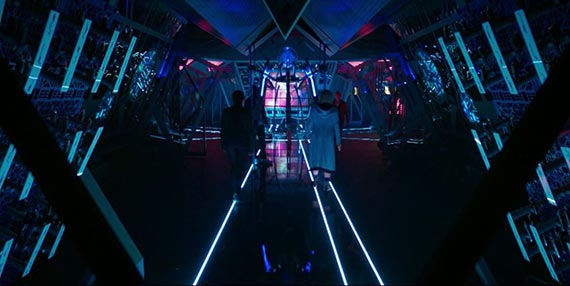
Sadly, this is about all of the character development allotted to Ryan, this episode. Rather than Ryan, it is Tibo – – conveniently introduced in the Series 12 premiere in order to make his appearance in this episode seem organic, à la Courtney Woods or the Maitland children – – who is important to the episode’s discourse on depression. This could’ve been a good opportunity to incorporate Ryan’s dyspraxia, perhaps by reiterating that he fears not being able to complete physical tasks like ladder climbing, as seen in “The Ghost Monument.”
Graham’s involvement in the story is largely redundant, especially as it references his Series 11 character arc that was resolved in “It Takes You Away” and “The Battle of Ranskoor Av Kolos.” While it is sensible that Graham continues to miss Grace, “Can You Hear Me?” doesn’t cover any new emotional ground and, save for the surprise cameo from the always wonderful Sharon D. Clarke, the storyline feels recycled.
Note that, in the epilogue, Graham whispers to the Doctor his concerns about his cancer returning. Ostensibly, he does not wish to scare his grandson, Ryan, sitting a few feet away, but it is also clear that Graham is reticent to admit his own fears. While affecting, this scene highlights the Doctor’s reaction over Graham’s anxieties: for once, the Doctor doesn’t know what to say. Not only does the scene force the audience to ponder whether cancer would be a concern to a race that can live thousands of years, experience all of time and space, and regenerate their dying bodies, the Doctor’s response that, “In a minute, I’ll think of something I should have said that might’ve been helpful” restates the episode’s premise that “help” for mental health issues can take many forms – – the most important thing is that one continues to make the effort.
This episode could’ve spent more time exploring the companions’ relationship with depression had it not included Tahira, who is completely unnecessary to the plot. Yes, the Chagaska is pulled from her nightmares via “tranquilizing psychoextraction,” but that monster could’ve been replaced with the Dregs, revealed in this episode to still haunt Ryan’s memory, thus giving him a larger role in the episode and a chance to develop by overcoming his fear.

This revelation does raise an interesting point: the companions are certainly being affected by their time with the Doctor – – Ryan, by the things he cannot unsee, and Yaz by the things she is missing, including the maturation of her sister, Sonya. “How long is this going to last, Yaz, hanging out with the Doctor?” Ryan asks, admitting that they are “ignoring home” and “missing out on bits of [loved ones’] lives.” As in “Nikola Tesla’s Night of Terror,” Ryan again considers his life away from the TARDIS and how, as Yaz reminds him, “The Doctor said we won’t come back the same.” Hopefully, with only three episodes left in Series 12, the narrative will further explore this unique take on how traveling aboard the TARDIS adversely effects the humans the Doctor takes as her companions.
(Time) Capsule Review
Featuring haunting dream imagery and a non-linear storyline, “Can You Hear Me?” not only presents a frank examination of the isolating effects of depression, it proffers several examples of what care might look like – – be it group therapy; one-on-one counseling with a professional; or a casual confession to a trusted, though unprepared friend. Further, the episode develops the Doctor beyond her characteristic, warm and friendly demeanor, allowing Jodie Whittaker to demonstrate greater range.



